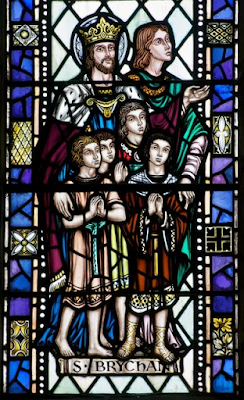06 April 2019
Righteous Brychan of Brecknock, King of Brycheiniog
The sixth of April is the feast-day of Brychan Brycheiniog, the formidable and semi-legendary patriarch of an entire tribe of Welsh holy men and women in the Age of Saints. He is recognised as a saint in the Orthodox Church, particularly in the Western Rite churches. Some of his holy children include Cynog, Nectan, Clether, Gwen, Gwladys, Mwynen, Mynfrewy, Tydfil and Cynheiddon ‘Endelyn’, though according to the old Welsh genealogies some of these may have been his grandchildren rather than his children.
Brychan [also Brecon or Brocanus] was born to an Irish father, Anlach mac Coronach, and his Welsh wife, Marchell ach Tewdrig – the heiress to the kingdom of Garthmadryn. Princess Marchell had fled to Ireland to escape a particularly harsh and hungry winter in her own kingdom, and there Anlach met her and desired her. She agreed to wed him, but only on the condition that their children be raised in her own land. Brychan was thus born in Y Fenni-fach, in Garthmadryn. His name comes from the Brythonic word brych, cognate with Goidelic brecc meaning ‘speckled’; he may therefore have been born with freckles.
When he was four years old, Brychan was entrusted by his parents to the care of a blind old man named Drichan, who lived by the river Ysgir. He spent seven years learning from Drichan all he could about the ways of the world, and at last the blind old man asked Brychan to give him his spear. Brychan brought it, and with it, Saint Drichan pointed to first a boar, then a deer, which came forth from the forest to the river to stand with a fish beneath a beech tree, on which stood a beehive dripping with honey. By these omens, Drichan predicted a great future for the young Brychan.
After a period of strife between Garthmadryn and Powys, in which Powys emerged the victor, Anlach King was forced to send his son to the court in Powys as hostage and guaranty for the peace he made with Banadl, king of Powys. While in this captivity, Brychan fell in love with Banadl’s daughter, Banhadlwedd. A hostage was not welcome, of course, to pay suit to the king’s daughter who held him thus, and so Brychan ‘seduced’ Banhadlwedd in secret. When at last Banadl sent Brychan back to Garthmadryn, it was with a heavily-pregnant Banhadlwedd in tow. Once there Banhadlwedd gave birth to Saint Cynog, to whom Brychan gave the four-piece torc of wrought iron and gold which became Cynog’s most-mentioned relic.
Brychan was raised to the kingship of Garthmadryn after his own father’s death, by the consent of the lords of that country. So successful was his kingship there, as the wise man Drichan had foreseen, that the kingdom itself would come to be named for him: Brycheiniog. He was known for his fair judgements and his generosity to the poor, and was also a prominent benefactor of the Church in Britain. Brychan would go on to marry three other women, though sources vary on what their names were. One of them was probably named Prawst ferch Tudwal. By them he would father, by a popular tradition, twenty-four sons and twenty-four daughters, many of whom became saints – bearing their mission in particular to Devon and Cornwall – and many of whom gave rise to saintly offspring in turn.
Brychan’s piety, however, was of a distinctly ‘martial’ type: his decency to his people and his generosity to the Church were matched if not overmatched by the ferocity with which he treated his enemies. It also seems that however he behaved in the court of Powys he was determined not to allow the same in his own court. A certain Welsh sub-king of Glywysing, Gwynllyw Farfog ap Glywys, fell in love with Brychan’s daughter Gwladys, in much the same way Brychan himself had fallen in love with Banhadlwedd. Three times he paid suit formally to Gwladys, and three times he was rejected by her father. In response to this, Gwynllyw led a raid on Brecon with three hundred men and carried Gwladys off by force. Brychan flew into a rage on discovering this, and gave heavy armed pursuit to Gwynllyw, determined to kill him. Brychan chased Gwynllyw all the way to Fochriw when both men were stopped by the high king Arthur. Arthur adjudicated their dispute and allowed Gwynllyw to marry Gwladys.
On another occasion, Brychan made war on Dyfed for a raid conducted by its king, who sought to overturn a boast that no spoil could be taken from Brycheiniog. Brychan led a punitive expedition against Dyfed and won a great victory against its king. He dismembered the hands of the Dyfed men and displayed them on pikes as a warning to any other would-be thieves and raiders.
When he came to old age, Brychan abdicated his throne in favour of his son, Rhain Dremrudd ap Brychan, and left his homeland to become a hermit. Tradition holds that he lived out the rest of his days on this earth on a remote island, Ynys Brychan – tentatively identified as Lundy Island – and reposed sometime in the middle of the fifth century. Righteous Brychan Brycheiniog, father of many saints, pray unto Christ our God that our souls may be saved!
Labels:
Britannia,
Hibernia,
history,
mediæval nonsense,
Pravoslávie,
prayers
Subscribe to:
Post Comments (Atom)














No comments:
Post a Comment